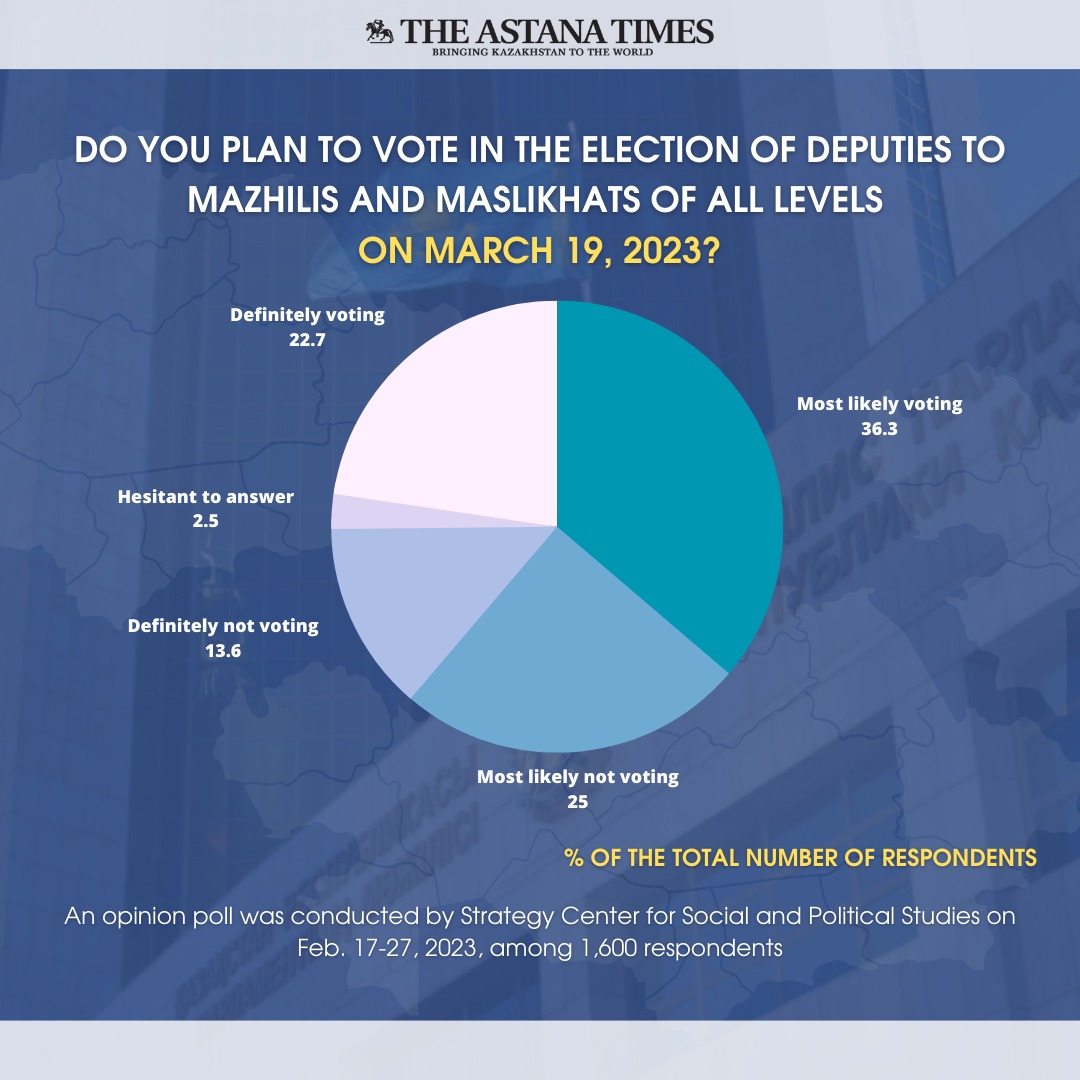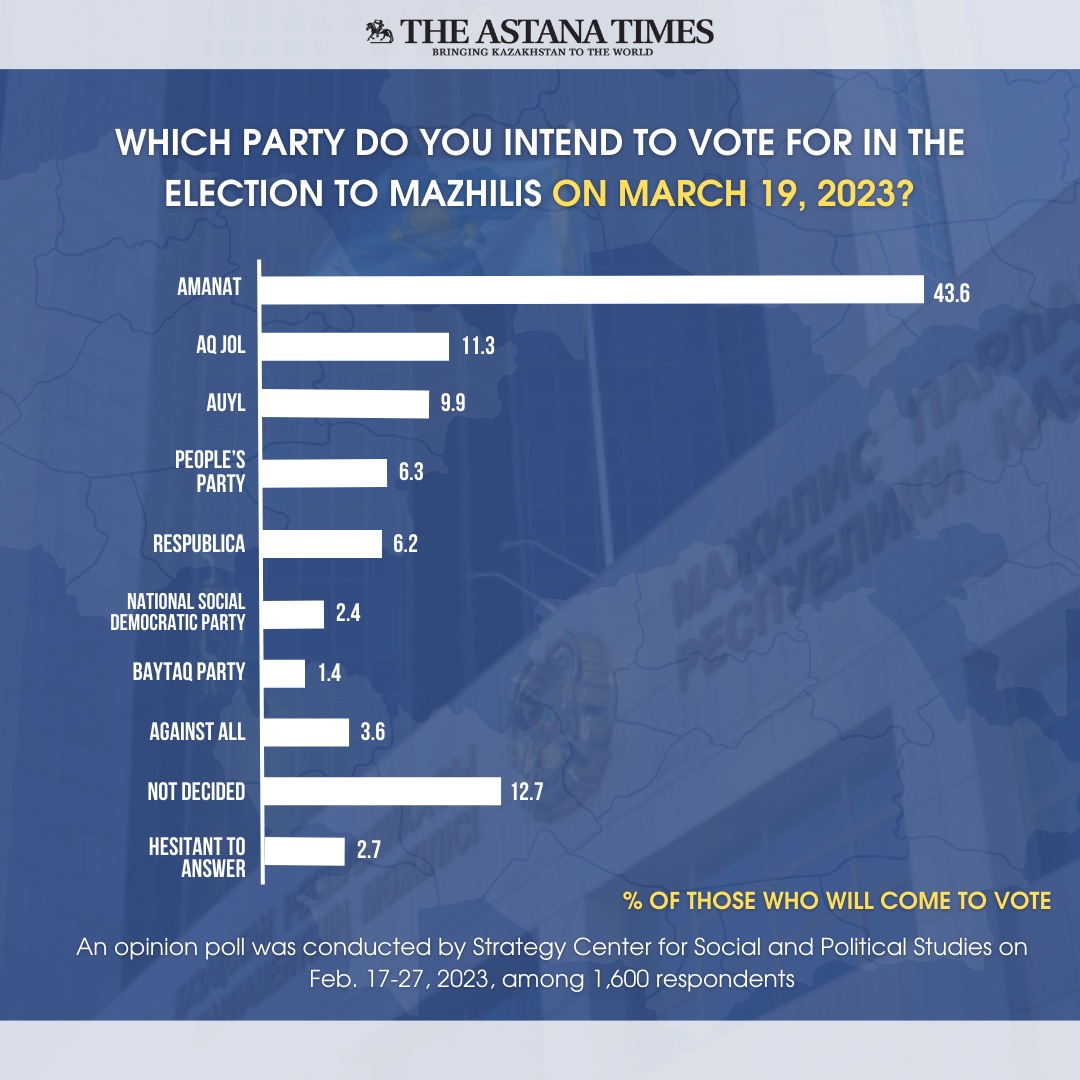ASTANA – The Strategy Center for Social and Political Studies expects a voter turnout of 59 percent in the upcoming parliamentary election on March 19, based on a survey the organization conducted in February.

The center, accredited by the Central Election Commission (CEC) to conduct public opinion polls, surveyed 1,600 respondents in all regions and cities of national significance between Feb. 17 and Feb. 27.
22.7 percent of respondents said they would “definitely go to the polls,” while 36.3 percent said they would “probably vote”. 38.6 percent of the respondents do not intend to vote, including 25 percent who are likely not to vote and 13.6 percent who definitely will not vote.
“The parliamentary election will take place in less than two weeks. Undoubtedly, this electoral campaign has attracted much more attention than the previous ones because this election is taking place in completely new conditions,” said Madi Omarov, political scientist and project coordinator at the center.
“The restoration of the mixed system of electing members of the Mazhilis (lower house of parliament) and maslikhats (local representative bodies), registration of independent self-nominated candidates, rebranding of the ruling party, and the emergence of two new parties are just some of the changes that characterize the current election cycle, not to mention the political context in which it is held,” he added.
3.6 percent of the respondents intend to vote “against all,” while 12.7 are still undecided. 2.7 percent found it difficult to answer the question.

The survey also asked the respondents about their attitudes towards the seven political parties participating in the election.
The Amanat party, which won the majority of seats in the 2021 Mazhilis election, received the greatest support. 43.6 percent of those who are planning to cast their ballot intend to vote for the party. However, this is much lower than 71 percent that the party received in the 2021 election.
“Significant decrease in the support for the party is most likely due to several factors, including President Tokayev’s resignation as party leader, rebranding, and the decline in popularity after the events of January 2022,” said Omarov.
11.3 percent of the respondents support the Aq Jol party, close to 10.95 percent that it received in 2021. This similarity indicates a “fairly stable electorate that does not change much over time,” according to Omarov.
9.9 percent of respondents favor the Auyl party, which is high, according to Omarov, considering that the party did not pass the threshold of seven (currently five) percent to get seats in the Mazhilis in the previous election.
“Besides these three parties, two other parties – the People’s Party of Kazakhstan and Respublica – can surpass the five percent threshold. The support for them is similar at 6.3 percent and 6.2 percent respectively. Respublica’s numbers are quite impressive, considering that it was registered only a few months before the election. Good marketing, especially online, as well as the presence of many well-known media personalities on the party list, likely played in the party’s favor,” said Omarov.
The outlook is less positive for the National Social Democratic Party and the Baytaq party, which received 2.4 percent and 1.5 percent of support from the respondents respectively.
Among the key takeaways is the high possibility of an increased plurality of voices in the new Mazhilis. Two of the seven parties have never held seats in the Parliament or participated in the election.
It is likely that the ruling Amanat party will be increasingly challenged by other parties.
“The number of MPs of the ruling Amanat party should significantly decrease. They will probably manage to reach the required number to get a majority through single-mandate constituencies. But it is also possible that for the first time in the history of Kazakhstan’s parliamentarism, this party will have to form a majority coalition with another party,” Omarov suggested.
The Strategy center is one of five organizations accredited by CEC to conduct public opinion polls, including exit polls on election day. CEC is continuing to accredit international observers until March 13. The election campaigning will last through midnight of March 18.

